The Separation of Powers: Malaysia's Politics and Government
VerifiedAdded on 2021/07/13
|10
|2803
|409
Essay
AI Summary
This essay provides a comprehensive analysis of the separation of powers within Malaysia's political and governmental framework. It begins by defining the concept of separation of powers and its significance, contrasting it with the trias politica principle. The essay then explores the Malaysian political system, including its constitutional monarchy and parliamentary framework, detailing the roles of the Yang di-Pertuan Agong and the Prime Minister. It examines the three branches of government: the legislative (Parliament and State Legislative Assembly), the executive (headed by the Prime Minister and Cabinet), and the judiciary. Each branch's functions, importance, and uses are thoroughly discussed, including the legislative's law-making, deliberation, expenditure authorization, and representation functions; the executive's law enforcement, delegated legislation, and treaty-making functions; and the judiciary's interpretation and application of laws, equity legislation, and protection of rights. The essay also evaluates the effectiveness of the separation of powers in safeguarding liberty, rights, and preventing abuse of power within the Malaysian context.
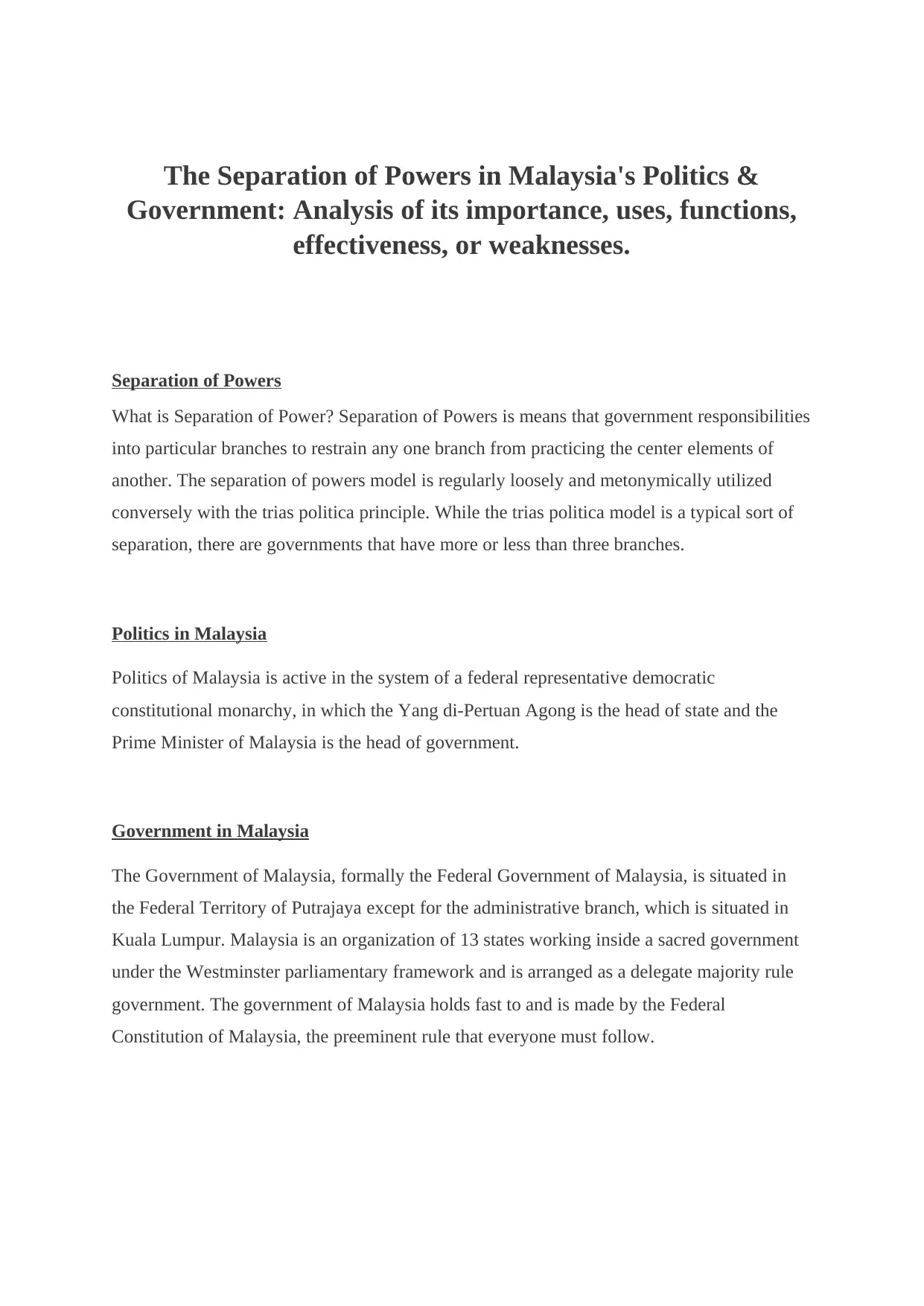
The Separation of Powers in Malaysia's Politics &
Government: Analysis of its importance, uses, functions,
effectiveness, or weaknesses.
Separation of Powers
What is Separation of Power? Separation of Powers is means that government responsibilities
into particular branches to restrain any one branch from practicing the center elements of
another. The separation of powers model is regularly loosely and metonymically utilized
conversely with the trias politica principle. While the trias politica model is a typical sort of
separation, there are governments that have more or less than three branches.
Politics in Malaysia
Politics of Malaysia is active in the system of a federal representative democratic
constitutional monarchy, in which the Yang di-Pertuan Agong is the head of state and the
Prime Minister of Malaysia is the head of government.
Government in Malaysia
The Government of Malaysia, formally the Federal Government of Malaysia, is situated in
the Federal Territory of Putrajaya except for the administrative branch, which is situated in
Kuala Lumpur. Malaysia is an organization of 13 states working inside a sacred government
under the Westminster parliamentary framework and is arranged as a delegate majority rule
government. The government of Malaysia holds fast to and is made by the Federal
Constitution of Malaysia, the preeminent rule that everyone must follow.
Government: Analysis of its importance, uses, functions,
effectiveness, or weaknesses.
Separation of Powers
What is Separation of Power? Separation of Powers is means that government responsibilities
into particular branches to restrain any one branch from practicing the center elements of
another. The separation of powers model is regularly loosely and metonymically utilized
conversely with the trias politica principle. While the trias politica model is a typical sort of
separation, there are governments that have more or less than three branches.
Politics in Malaysia
Politics of Malaysia is active in the system of a federal representative democratic
constitutional monarchy, in which the Yang di-Pertuan Agong is the head of state and the
Prime Minister of Malaysia is the head of government.
Government in Malaysia
The Government of Malaysia, formally the Federal Government of Malaysia, is situated in
the Federal Territory of Putrajaya except for the administrative branch, which is situated in
Kuala Lumpur. Malaysia is an organization of 13 states working inside a sacred government
under the Westminster parliamentary framework and is arranged as a delegate majority rule
government. The government of Malaysia holds fast to and is made by the Federal
Constitution of Malaysia, the preeminent rule that everyone must follow.
Paraphrase This Document
Need a fresh take? Get an instant paraphrase of this document with our AI Paraphraser
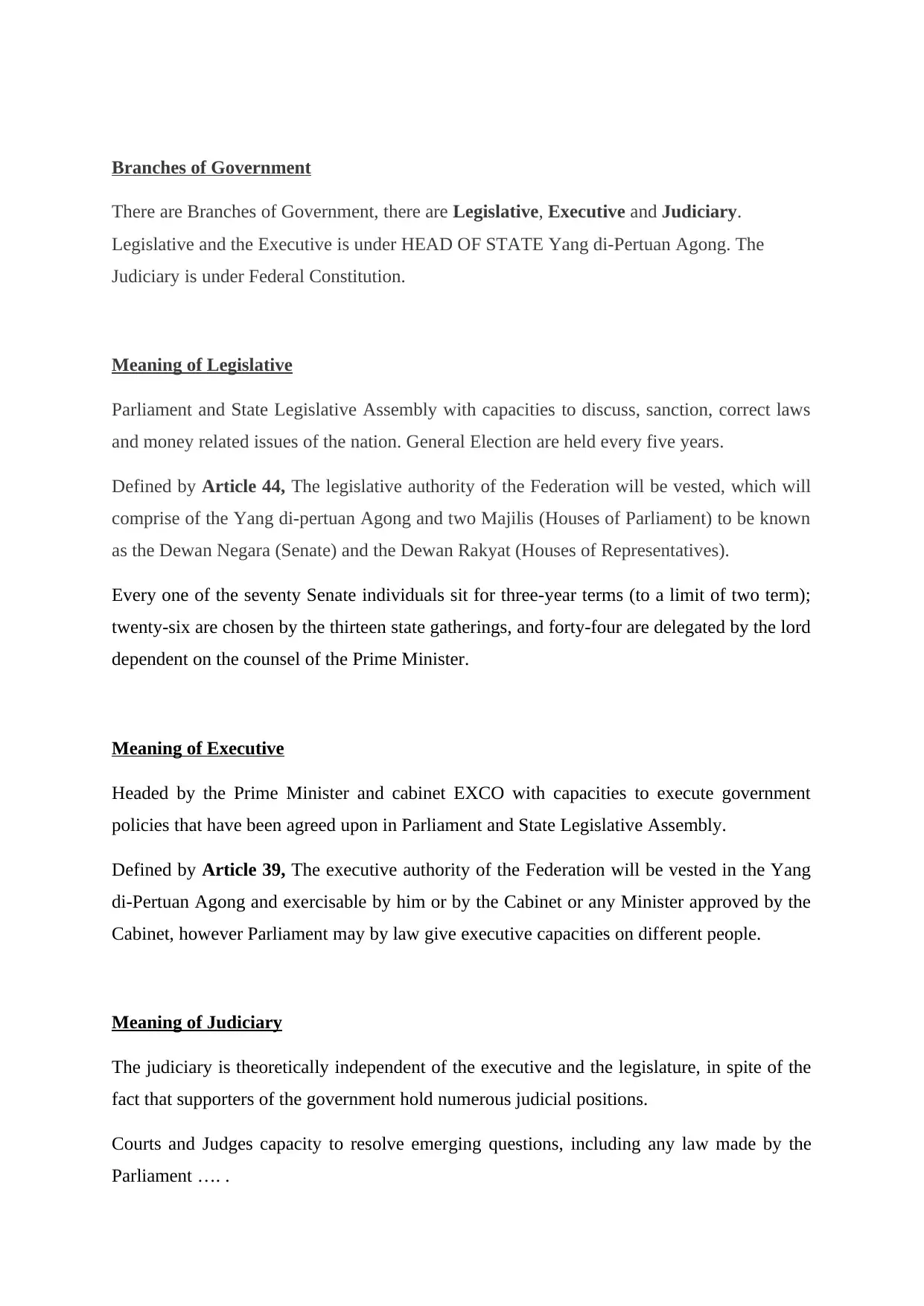
Branches of Government
There are Branches of Government, there are Legislative, Executive and Judiciary.
Legislative and the Executive is under HEAD OF STATE Yang di-Pertuan Agong. The
Judiciary is under Federal Constitution.
Meaning of Legislative
Parliament and State Legislative Assembly with capacities to discuss, sanction, correct laws
and money related issues of the nation. General Election are held every five years.
Defined by Article 44, The legislative authority of the Federation will be vested, which will
comprise of the Yang di-pertuan Agong and two Majilis (Houses of Parliament) to be known
as the Dewan Negara (Senate) and the Dewan Rakyat (Houses of Representatives).
Every one of the seventy Senate individuals sit for three-year terms (to a limit of two term);
twenty-six are chosen by the thirteen state gatherings, and forty-four are delegated by the lord
dependent on the counsel of the Prime Minister.
Meaning of Executive
Headed by the Prime Minister and cabinet EXCO with capacities to execute government
policies that have been agreed upon in Parliament and State Legislative Assembly.
Defined by Article 39, The executive authority of the Federation will be vested in the Yang
di-Pertuan Agong and exercisable by him or by the Cabinet or any Minister approved by the
Cabinet, however Parliament may by law give executive capacities on different people.
Meaning of Judiciary
The judiciary is theoretically independent of the executive and the legislature, in spite of the
fact that supporters of the government hold numerous judicial positions.
Courts and Judges capacity to resolve emerging questions, including any law made by the
Parliament …. .
There are Branches of Government, there are Legislative, Executive and Judiciary.
Legislative and the Executive is under HEAD OF STATE Yang di-Pertuan Agong. The
Judiciary is under Federal Constitution.
Meaning of Legislative
Parliament and State Legislative Assembly with capacities to discuss, sanction, correct laws
and money related issues of the nation. General Election are held every five years.
Defined by Article 44, The legislative authority of the Federation will be vested, which will
comprise of the Yang di-pertuan Agong and two Majilis (Houses of Parliament) to be known
as the Dewan Negara (Senate) and the Dewan Rakyat (Houses of Representatives).
Every one of the seventy Senate individuals sit for three-year terms (to a limit of two term);
twenty-six are chosen by the thirteen state gatherings, and forty-four are delegated by the lord
dependent on the counsel of the Prime Minister.
Meaning of Executive
Headed by the Prime Minister and cabinet EXCO with capacities to execute government
policies that have been agreed upon in Parliament and State Legislative Assembly.
Defined by Article 39, The executive authority of the Federation will be vested in the Yang
di-Pertuan Agong and exercisable by him or by the Cabinet or any Minister approved by the
Cabinet, however Parliament may by law give executive capacities on different people.
Meaning of Judiciary
The judiciary is theoretically independent of the executive and the legislature, in spite of the
fact that supporters of the government hold numerous judicial positions.
Courts and Judges capacity to resolve emerging questions, including any law made by the
Parliament …. .
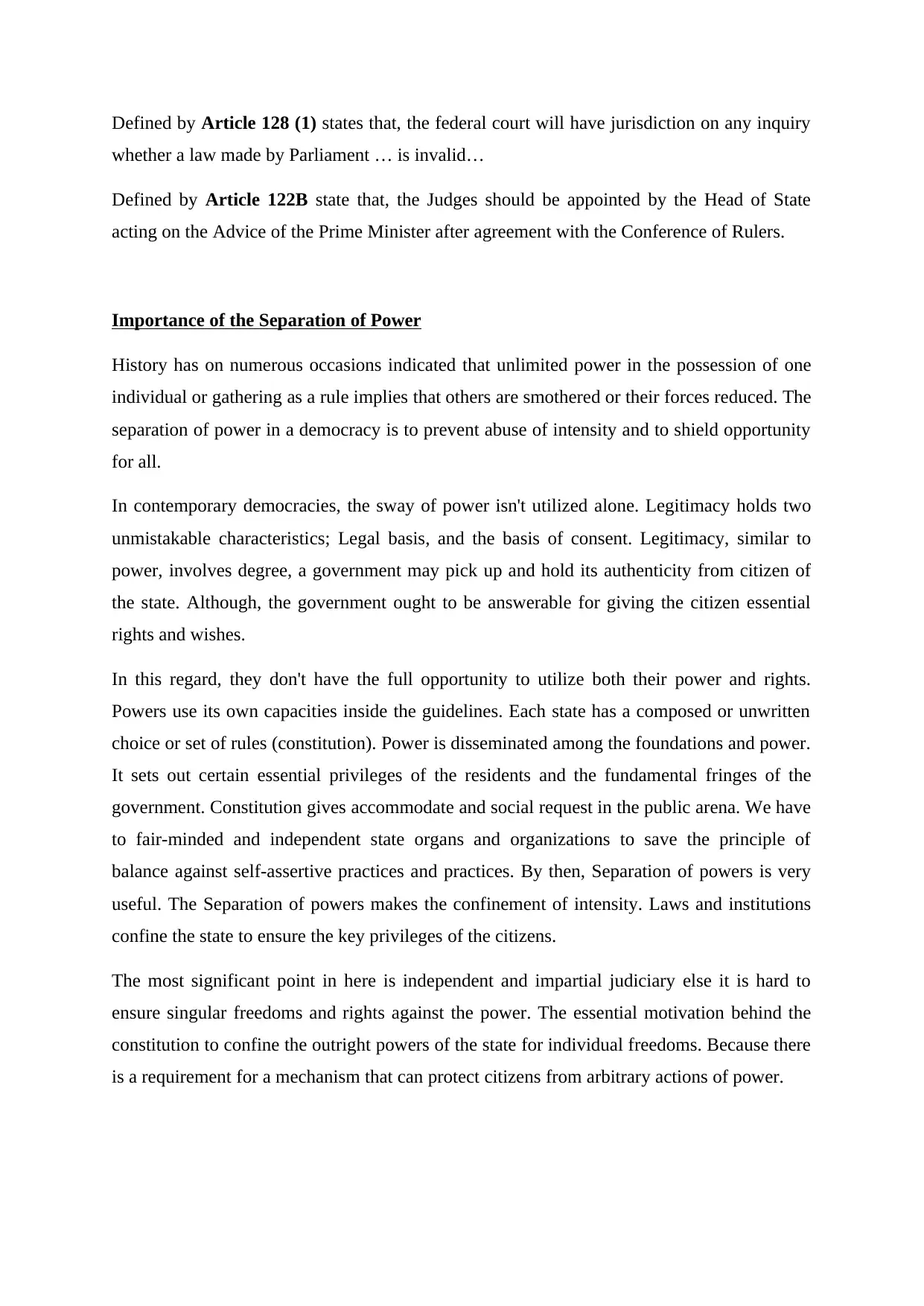
Defined by Article 128 (1) states that, the federal court will have jurisdiction on any inquiry
whether a law made by Parliament … is invalid…
Defined by Article 122B state that, the Judges should be appointed by the Head of State
acting on the Advice of the Prime Minister after agreement with the Conference of Rulers.
Importance of the Separation of Power
History has on numerous occasions indicated that unlimited power in the possession of one
individual or gathering as a rule implies that others are smothered or their forces reduced. The
separation of power in a democracy is to prevent abuse of intensity and to shield opportunity
for all.
In contemporary democracies, the sway of power isn't utilized alone. Legitimacy holds two
unmistakable characteristics; Legal basis, and the basis of consent. Legitimacy, similar to
power, involves degree, a government may pick up and hold its authenticity from citizen of
the state. Although, the government ought to be answerable for giving the citizen essential
rights and wishes.
In this regard, they don't have the full opportunity to utilize both their power and rights.
Powers use its own capacities inside the guidelines. Each state has a composed or unwritten
choice or set of rules (constitution). Power is disseminated among the foundations and power.
It sets out certain essential privileges of the residents and the fundamental fringes of the
government. Constitution gives accommodate and social request in the public arena. We have
to fair-minded and independent state organs and organizations to save the principle of
balance against self-assertive practices and practices. By then, Separation of powers is very
useful. The Separation of powers makes the confinement of intensity. Laws and institutions
confine the state to ensure the key privileges of the citizens.
The most significant point in here is independent and impartial judiciary else it is hard to
ensure singular freedoms and rights against the power. The essential motivation behind the
constitution to confine the outright powers of the state for individual freedoms. Because there
is a requirement for a mechanism that can protect citizens from arbitrary actions of power.
whether a law made by Parliament … is invalid…
Defined by Article 122B state that, the Judges should be appointed by the Head of State
acting on the Advice of the Prime Minister after agreement with the Conference of Rulers.
Importance of the Separation of Power
History has on numerous occasions indicated that unlimited power in the possession of one
individual or gathering as a rule implies that others are smothered or their forces reduced. The
separation of power in a democracy is to prevent abuse of intensity and to shield opportunity
for all.
In contemporary democracies, the sway of power isn't utilized alone. Legitimacy holds two
unmistakable characteristics; Legal basis, and the basis of consent. Legitimacy, similar to
power, involves degree, a government may pick up and hold its authenticity from citizen of
the state. Although, the government ought to be answerable for giving the citizen essential
rights and wishes.
In this regard, they don't have the full opportunity to utilize both their power and rights.
Powers use its own capacities inside the guidelines. Each state has a composed or unwritten
choice or set of rules (constitution). Power is disseminated among the foundations and power.
It sets out certain essential privileges of the residents and the fundamental fringes of the
government. Constitution gives accommodate and social request in the public arena. We have
to fair-minded and independent state organs and organizations to save the principle of
balance against self-assertive practices and practices. By then, Separation of powers is very
useful. The Separation of powers makes the confinement of intensity. Laws and institutions
confine the state to ensure the key privileges of the citizens.
The most significant point in here is independent and impartial judiciary else it is hard to
ensure singular freedoms and rights against the power. The essential motivation behind the
constitution to confine the outright powers of the state for individual freedoms. Because there
is a requirement for a mechanism that can protect citizens from arbitrary actions of power.
⊘ This is a preview!⊘
Do you want full access?
Subscribe today to unlock all pages.

Trusted by 1+ million students worldwide
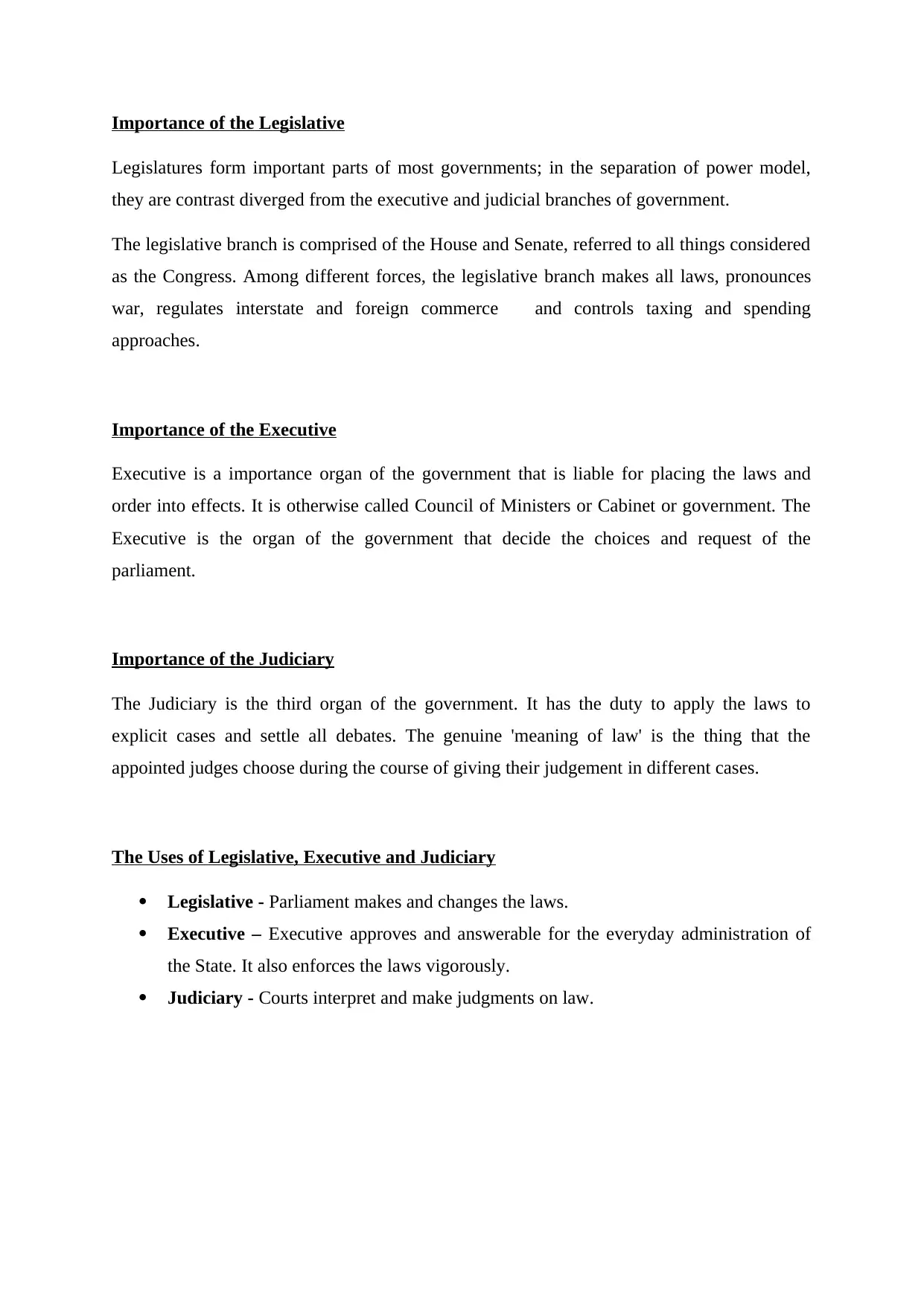
Importance of the Legislative
Legislatures form important parts of most governments; in the separation of power model,
they are contrast diverged from the executive and judicial branches of government.
The legislative branch is comprised of the House and Senate, referred to all things considered
as the Congress. Among different forces, the legislative branch makes all laws, pronounces
war, regulates interstate and foreign commerce and controls taxing and spending
approaches.
Importance of the Executive
Executive is a importance organ of the government that is liable for placing the laws and
order into effects. It is otherwise called Council of Ministers or Cabinet or government. The
Executive is the organ of the government that decide the choices and request of the
parliament.
Importance of the Judiciary
The Judiciary is the third organ of the government. It has the duty to apply the laws to
explicit cases and settle all debates. The genuine 'meaning of law' is the thing that the
appointed judges choose during the course of giving their judgement in different cases.
The Uses of Legislative, Executive and Judiciary
Legislative - Parliament makes and changes the laws.
Executive – Executive approves and answerable for the everyday administration of
the State. It also enforces the laws vigorously.
Judiciary - Courts interpret and make judgments on law.
Legislatures form important parts of most governments; in the separation of power model,
they are contrast diverged from the executive and judicial branches of government.
The legislative branch is comprised of the House and Senate, referred to all things considered
as the Congress. Among different forces, the legislative branch makes all laws, pronounces
war, regulates interstate and foreign commerce and controls taxing and spending
approaches.
Importance of the Executive
Executive is a importance organ of the government that is liable for placing the laws and
order into effects. It is otherwise called Council of Ministers or Cabinet or government. The
Executive is the organ of the government that decide the choices and request of the
parliament.
Importance of the Judiciary
The Judiciary is the third organ of the government. It has the duty to apply the laws to
explicit cases and settle all debates. The genuine 'meaning of law' is the thing that the
appointed judges choose during the course of giving their judgement in different cases.
The Uses of Legislative, Executive and Judiciary
Legislative - Parliament makes and changes the laws.
Executive – Executive approves and answerable for the everyday administration of
the State. It also enforces the laws vigorously.
Judiciary - Courts interpret and make judgments on law.
Paraphrase This Document
Need a fresh take? Get an instant paraphrase of this document with our AI Paraphraser
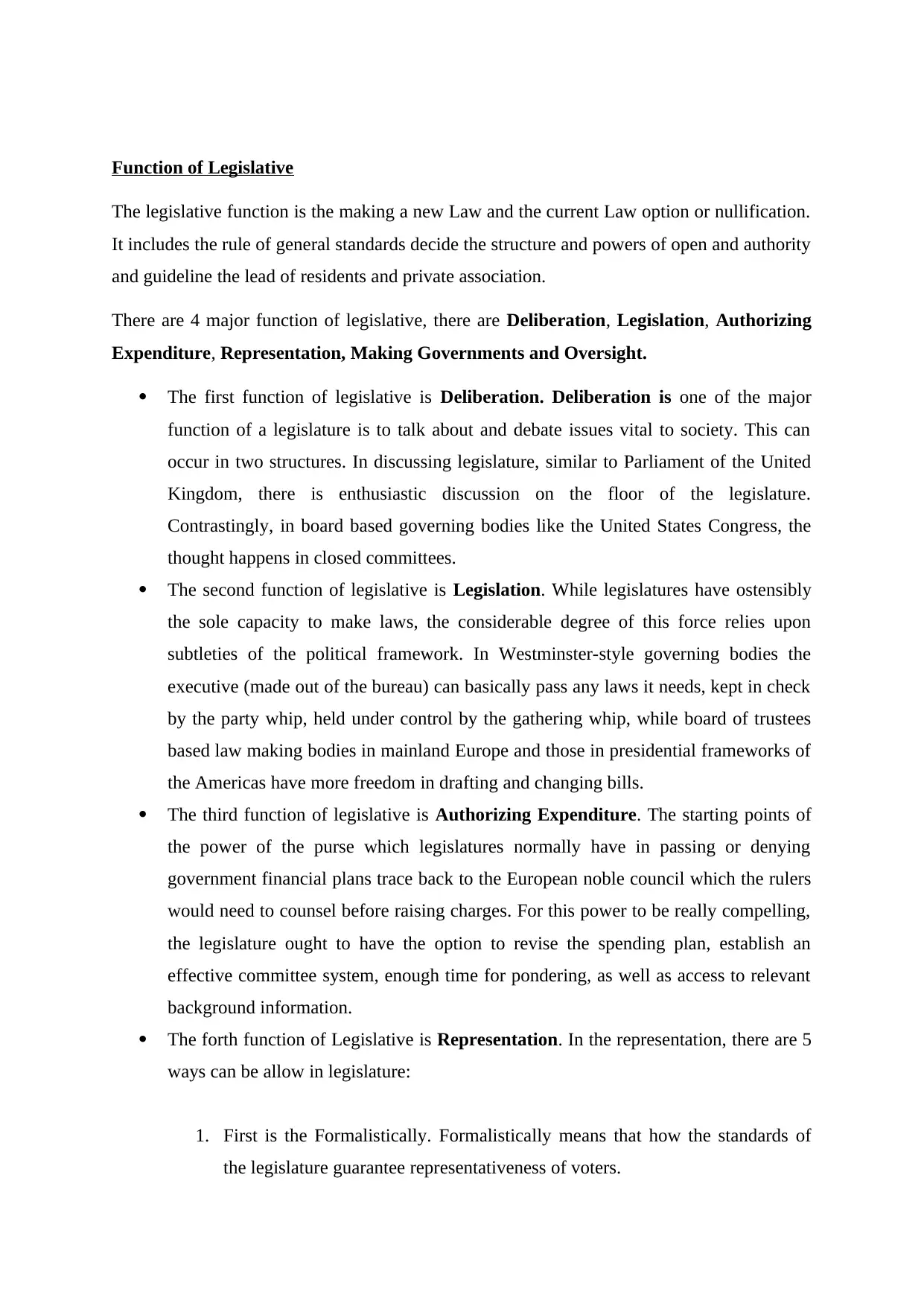
Function of Legislative
The legislative function is the making a new Law and the current Law option or nullification.
It includes the rule of general standards decide the structure and powers of open and authority
and guideline the lead of residents and private association.
There are 4 major function of legislative, there are Deliberation, Legislation, Authorizing
Expenditure, Representation, Making Governments and Oversight.
The first function of legislative is Deliberation. Deliberation is one of the major
function of a legislature is to talk about and debate issues vital to society. This can
occur in two structures. In discussing legislature, similar to Parliament of the United
Kingdom, there is enthusiastic discussion on the floor of the legislature.
Contrastingly, in board based governing bodies like the United States Congress, the
thought happens in closed committees.
The second function of legislative is Legislation. While legislatures have ostensibly
the sole capacity to make laws, the considerable degree of this force relies upon
subtleties of the political framework. In Westminster-style governing bodies the
executive (made out of the bureau) can basically pass any laws it needs, kept in check
by the party whip, held under control by the gathering whip, while board of trustees
based law making bodies in mainland Europe and those in presidential frameworks of
the Americas have more freedom in drafting and changing bills.
The third function of legislative is Authorizing Expenditure. The starting points of
the power of the purse which legislatures normally have in passing or denying
government financial plans trace back to the European noble council which the rulers
would need to counsel before raising charges. For this power to be really compelling,
the legislature ought to have the option to revise the spending plan, establish an
effective committee system, enough time for pondering, as well as access to relevant
background information.
The forth function of Legislative is Representation. In the representation, there are 5
ways can be allow in legislature:
1. First is the Formalistically. Formalistically means that how the standards of
the legislature guarantee representativeness of voters.
The legislative function is the making a new Law and the current Law option or nullification.
It includes the rule of general standards decide the structure and powers of open and authority
and guideline the lead of residents and private association.
There are 4 major function of legislative, there are Deliberation, Legislation, Authorizing
Expenditure, Representation, Making Governments and Oversight.
The first function of legislative is Deliberation. Deliberation is one of the major
function of a legislature is to talk about and debate issues vital to society. This can
occur in two structures. In discussing legislature, similar to Parliament of the United
Kingdom, there is enthusiastic discussion on the floor of the legislature.
Contrastingly, in board based governing bodies like the United States Congress, the
thought happens in closed committees.
The second function of legislative is Legislation. While legislatures have ostensibly
the sole capacity to make laws, the considerable degree of this force relies upon
subtleties of the political framework. In Westminster-style governing bodies the
executive (made out of the bureau) can basically pass any laws it needs, kept in check
by the party whip, held under control by the gathering whip, while board of trustees
based law making bodies in mainland Europe and those in presidential frameworks of
the Americas have more freedom in drafting and changing bills.
The third function of legislative is Authorizing Expenditure. The starting points of
the power of the purse which legislatures normally have in passing or denying
government financial plans trace back to the European noble council which the rulers
would need to counsel before raising charges. For this power to be really compelling,
the legislature ought to have the option to revise the spending plan, establish an
effective committee system, enough time for pondering, as well as access to relevant
background information.
The forth function of Legislative is Representation. In the representation, there are 5
ways can be allow in legislature:
1. First is the Formalistically. Formalistically means that how the standards of
the legislature guarantee representativeness of voters.
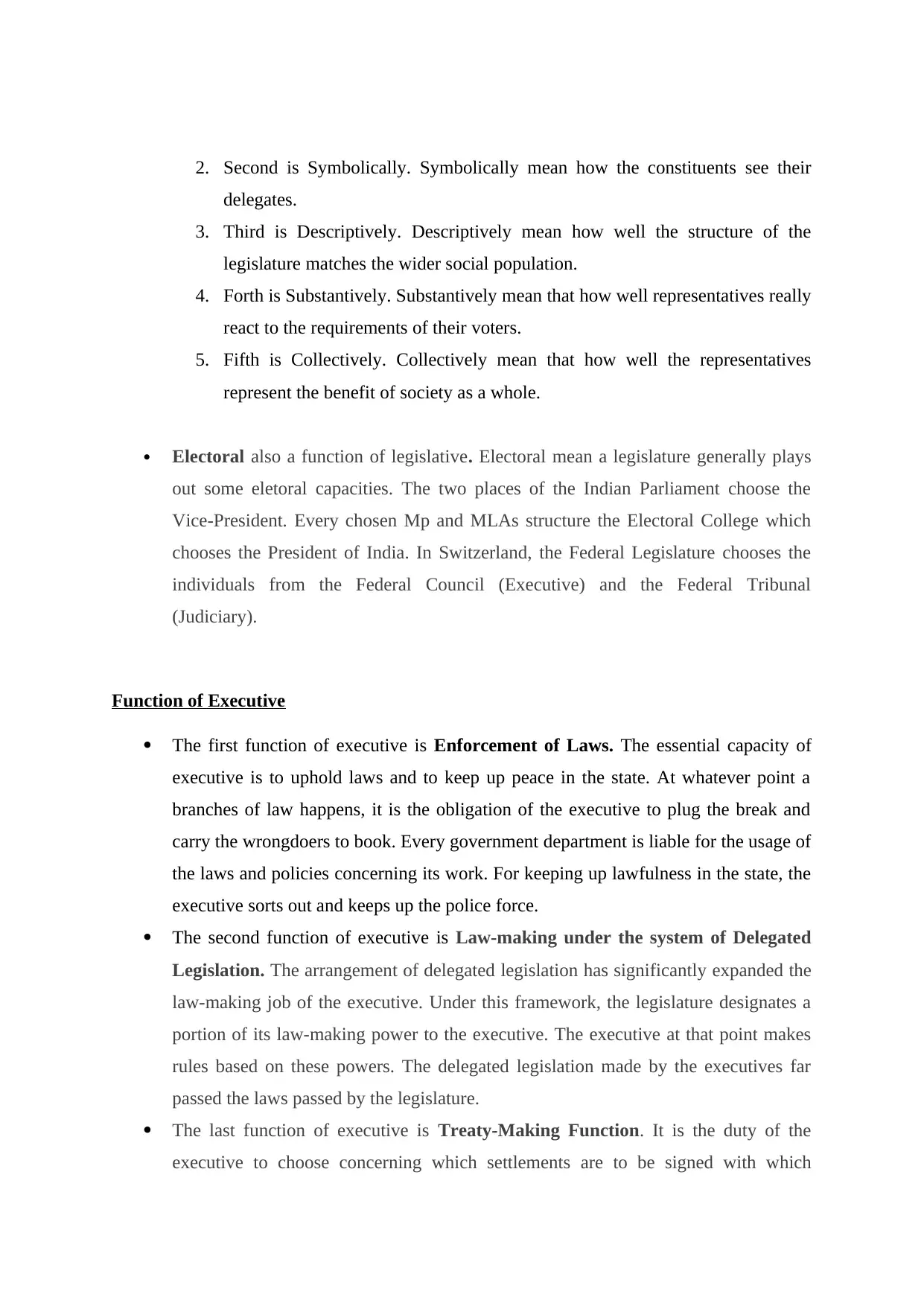
2. Second is Symbolically. Symbolically mean how the constituents see their
delegates.
3. Third is Descriptively. Descriptively mean how well the structure of the
legislature matches the wider social population.
4. Forth is Substantively. Substantively mean that how well representatives really
react to the requirements of their voters.
5. Fifth is Collectively. Collectively mean that how well the representatives
represent the benefit of society as a whole.
Electoral also a function of legislative. Electoral mean a legislature generally plays
out some eletoral capacities. The two places of the Indian Parliament choose the
Vice-President. Every chosen Mp and MLAs structure the Electoral College which
chooses the President of India. In Switzerland, the Federal Legislature chooses the
individuals from the Federal Council (Executive) and the Federal Tribunal
(Judiciary).
Function of Executive
The first function of executive is Enforcement of Laws. The essential capacity of
executive is to uphold laws and to keep up peace in the state. At whatever point a
branches of law happens, it is the obligation of the executive to plug the break and
carry the wrongdoers to book. Every government department is liable for the usage of
the laws and policies concerning its work. For keeping up lawfulness in the state, the
executive sorts out and keeps up the police force.
The second function of executive is Law-making under the system of Delegated
Legislation. The arrangement of delegated legislation has significantly expanded the
law-making job of the executive. Under this framework, the legislature designates a
portion of its law-making power to the executive. The executive at that point makes
rules based on these powers. The delegated legislation made by the executives far
passed the laws passed by the legislature.
The last function of executive is Treaty-Making Function. It is the duty of the
executive to choose concerning which settlements are to be signed with which
delegates.
3. Third is Descriptively. Descriptively mean how well the structure of the
legislature matches the wider social population.
4. Forth is Substantively. Substantively mean that how well representatives really
react to the requirements of their voters.
5. Fifth is Collectively. Collectively mean that how well the representatives
represent the benefit of society as a whole.
Electoral also a function of legislative. Electoral mean a legislature generally plays
out some eletoral capacities. The two places of the Indian Parliament choose the
Vice-President. Every chosen Mp and MLAs structure the Electoral College which
chooses the President of India. In Switzerland, the Federal Legislature chooses the
individuals from the Federal Council (Executive) and the Federal Tribunal
(Judiciary).
Function of Executive
The first function of executive is Enforcement of Laws. The essential capacity of
executive is to uphold laws and to keep up peace in the state. At whatever point a
branches of law happens, it is the obligation of the executive to plug the break and
carry the wrongdoers to book. Every government department is liable for the usage of
the laws and policies concerning its work. For keeping up lawfulness in the state, the
executive sorts out and keeps up the police force.
The second function of executive is Law-making under the system of Delegated
Legislation. The arrangement of delegated legislation has significantly expanded the
law-making job of the executive. Under this framework, the legislature designates a
portion of its law-making power to the executive. The executive at that point makes
rules based on these powers. The delegated legislation made by the executives far
passed the laws passed by the legislature.
The last function of executive is Treaty-Making Function. It is the duty of the
executive to choose concerning which settlements are to be signed with which
⊘ This is a preview!⊘
Do you want full access?
Subscribe today to unlock all pages.

Trusted by 1+ million students worldwide
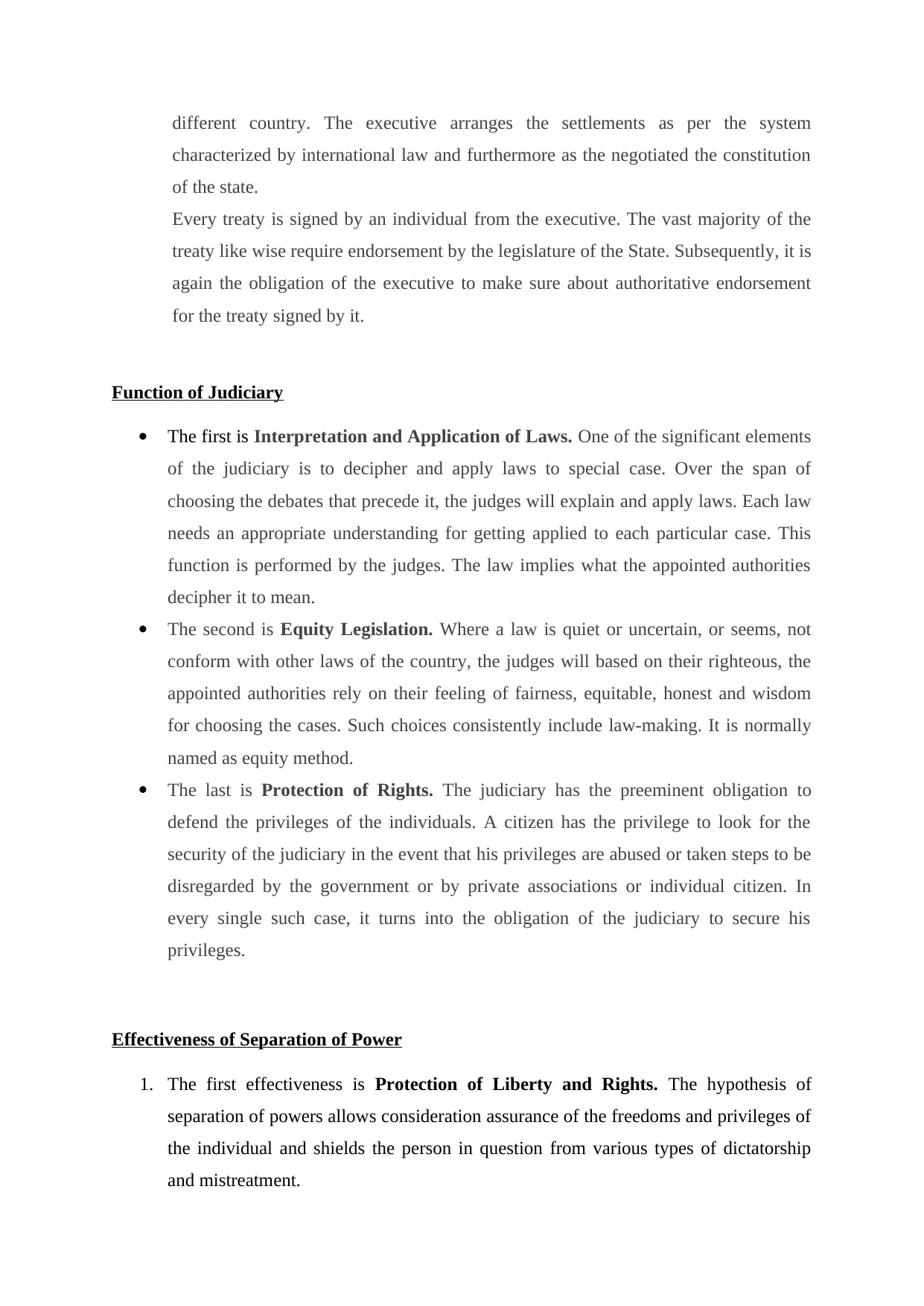
different country. The executive arranges the settlements as per the system
characterized by international law and furthermore as the negotiated the constitution
of the state.
Every treaty is signed by an individual from the executive. The vast majority of the
treaty like wise require endorsement by the legislature of the State. Subsequently, it is
again the obligation of the executive to make sure about authoritative endorsement
for the treaty signed by it.
Function of Judiciary
The first is Interpretation and Application of Laws. One of the significant elements
of the judiciary is to decipher and apply laws to special case. Over the span of
choosing the debates that precede it, the judges will explain and apply laws. Each law
needs an appropriate understanding for getting applied to each particular case. This
function is performed by the judges. The law implies what the appointed authorities
decipher it to mean.
The second is Equity Legislation. Where a law is quiet or uncertain, or seems, not
conform with other laws of the country, the judges will based on their righteous, the
appointed authorities rely on their feeling of fairness, equitable, honest and wisdom
for choosing the cases. Such choices consistently include law-making. It is normally
named as equity method.
The last is Protection of Rights. The judiciary has the preeminent obligation to
defend the privileges of the individuals. A citizen has the privilege to look for the
security of the judiciary in the event that his privileges are abused or taken steps to be
disregarded by the government or by private associations or individual citizen. In
every single such case, it turns into the obligation of the judiciary to secure his
privileges.
Effectiveness of Separation of Power
1. The first effectiveness is Protection of Liberty and Rights. The hypothesis of
separation of powers allows consideration assurance of the freedoms and privileges of
the individual and shields the person in question from various types of dictatorship
and mistreatment.
characterized by international law and furthermore as the negotiated the constitution
of the state.
Every treaty is signed by an individual from the executive. The vast majority of the
treaty like wise require endorsement by the legislature of the State. Subsequently, it is
again the obligation of the executive to make sure about authoritative endorsement
for the treaty signed by it.
Function of Judiciary
The first is Interpretation and Application of Laws. One of the significant elements
of the judiciary is to decipher and apply laws to special case. Over the span of
choosing the debates that precede it, the judges will explain and apply laws. Each law
needs an appropriate understanding for getting applied to each particular case. This
function is performed by the judges. The law implies what the appointed authorities
decipher it to mean.
The second is Equity Legislation. Where a law is quiet or uncertain, or seems, not
conform with other laws of the country, the judges will based on their righteous, the
appointed authorities rely on their feeling of fairness, equitable, honest and wisdom
for choosing the cases. Such choices consistently include law-making. It is normally
named as equity method.
The last is Protection of Rights. The judiciary has the preeminent obligation to
defend the privileges of the individuals. A citizen has the privilege to look for the
security of the judiciary in the event that his privileges are abused or taken steps to be
disregarded by the government or by private associations or individual citizen. In
every single such case, it turns into the obligation of the judiciary to secure his
privileges.
Effectiveness of Separation of Power
1. The first effectiveness is Protection of Liberty and Rights. The hypothesis of
separation of powers allows consideration assurance of the freedoms and privileges of
the individual and shields the person in question from various types of dictatorship
and mistreatment.
Paraphrase This Document
Need a fresh take? Get an instant paraphrase of this document with our AI Paraphraser
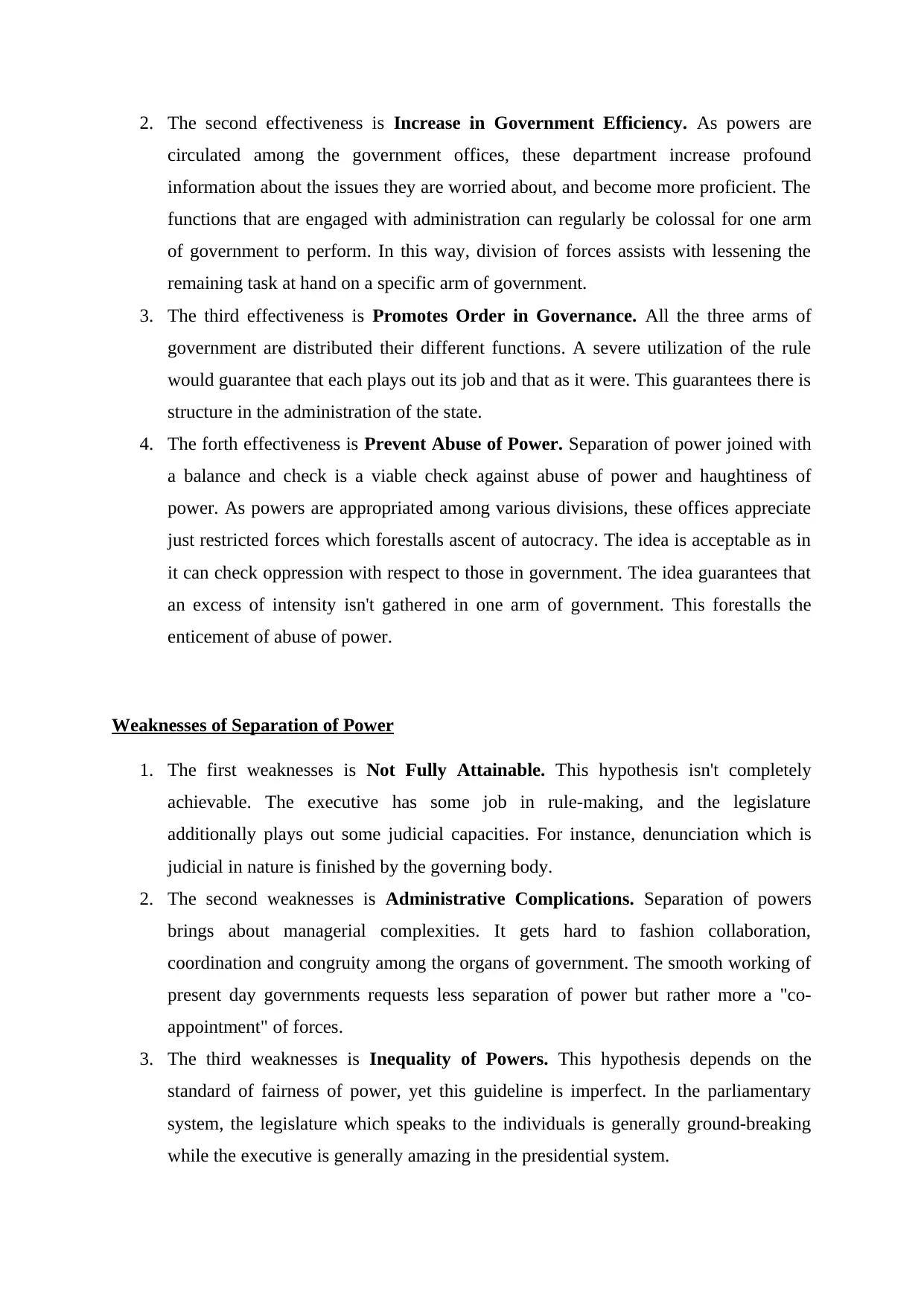
2. The second effectiveness is Increase in Government Efficiency. As powers are
circulated among the government offices, these department increase profound
information about the issues they are worried about, and become more proficient. The
functions that are engaged with administration can regularly be colossal for one arm
of government to perform. In this way, division of forces assists with lessening the
remaining task at hand on a specific arm of government.
3. The third effectiveness is Promotes Order in Governance. All the three arms of
government are distributed their different functions. A severe utilization of the rule
would guarantee that each plays out its job and that as it were. This guarantees there is
structure in the administration of the state.
4. The forth effectiveness is Prevent Abuse of Power. Separation of power joined with
a balance and check is a viable check against abuse of power and haughtiness of
power. As powers are appropriated among various divisions, these offices appreciate
just restricted forces which forestalls ascent of autocracy. The idea is acceptable as in
it can check oppression with respect to those in government. The idea guarantees that
an excess of intensity isn't gathered in one arm of government. This forestalls the
enticement of abuse of power.
Weaknesses of Separation of Power
1. The first weaknesses is Not Fully Attainable. This hypothesis isn't completely
achievable. The executive has some job in rule-making, and the legislature
additionally plays out some judicial capacities. For instance, denunciation which is
judicial in nature is finished by the governing body.
2. The second weaknesses is Administrative Complications. Separation of powers
brings about managerial complexities. It gets hard to fashion collaboration,
coordination and congruity among the organs of government. The smooth working of
present day governments requests less separation of power but rather more a "co-
appointment" of forces.
3. The third weaknesses is Inequality of Powers. This hypothesis depends on the
standard of fairness of power, yet this guideline is imperfect. In the parliamentary
system, the legislature which speaks to the individuals is generally ground-breaking
while the executive is generally amazing in the presidential system.
circulated among the government offices, these department increase profound
information about the issues they are worried about, and become more proficient. The
functions that are engaged with administration can regularly be colossal for one arm
of government to perform. In this way, division of forces assists with lessening the
remaining task at hand on a specific arm of government.
3. The third effectiveness is Promotes Order in Governance. All the three arms of
government are distributed their different functions. A severe utilization of the rule
would guarantee that each plays out its job and that as it were. This guarantees there is
structure in the administration of the state.
4. The forth effectiveness is Prevent Abuse of Power. Separation of power joined with
a balance and check is a viable check against abuse of power and haughtiness of
power. As powers are appropriated among various divisions, these offices appreciate
just restricted forces which forestalls ascent of autocracy. The idea is acceptable as in
it can check oppression with respect to those in government. The idea guarantees that
an excess of intensity isn't gathered in one arm of government. This forestalls the
enticement of abuse of power.
Weaknesses of Separation of Power
1. The first weaknesses is Not Fully Attainable. This hypothesis isn't completely
achievable. The executive has some job in rule-making, and the legislature
additionally plays out some judicial capacities. For instance, denunciation which is
judicial in nature is finished by the governing body.
2. The second weaknesses is Administrative Complications. Separation of powers
brings about managerial complexities. It gets hard to fashion collaboration,
coordination and congruity among the organs of government. The smooth working of
present day governments requests less separation of power but rather more a "co-
appointment" of forces.
3. The third weaknesses is Inequality of Powers. This hypothesis depends on the
standard of fairness of power, yet this guideline is imperfect. In the parliamentary
system, the legislature which speaks to the individuals is generally ground-breaking
while the executive is generally amazing in the presidential system.
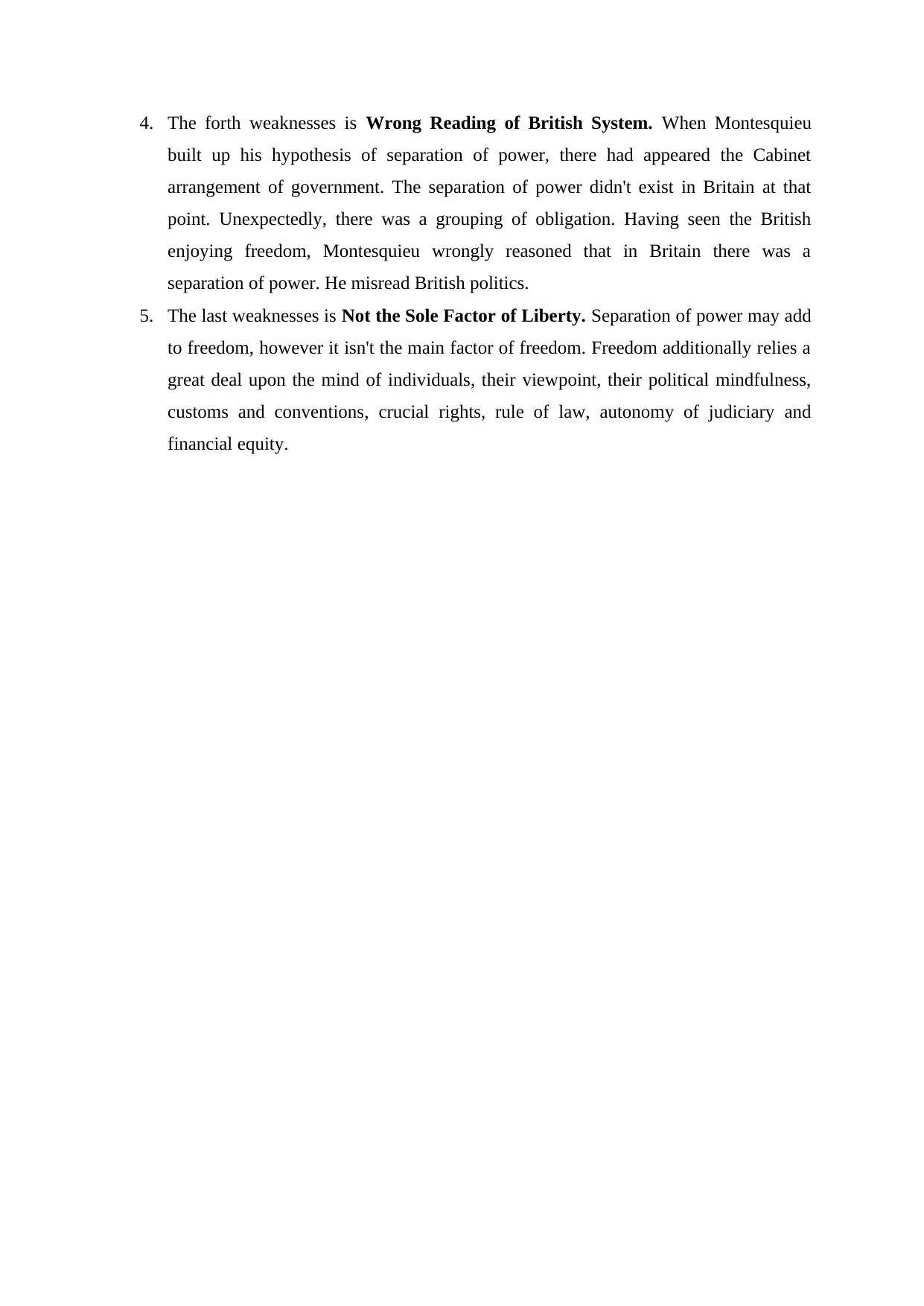
4. The forth weaknesses is Wrong Reading of British System. When Montesquieu
built up his hypothesis of separation of power, there had appeared the Cabinet
arrangement of government. The separation of power didn't exist in Britain at that
point. Unexpectedly, there was a grouping of obligation. Having seen the British
enjoying freedom, Montesquieu wrongly reasoned that in Britain there was a
separation of power. He misread British politics.
5. The last weaknesses is Not the Sole Factor of Liberty. Separation of power may add
to freedom, however it isn't the main factor of freedom. Freedom additionally relies a
great deal upon the mind of individuals, their viewpoint, their political mindfulness,
customs and conventions, crucial rights, rule of law, autonomy of judiciary and
financial equity.
built up his hypothesis of separation of power, there had appeared the Cabinet
arrangement of government. The separation of power didn't exist in Britain at that
point. Unexpectedly, there was a grouping of obligation. Having seen the British
enjoying freedom, Montesquieu wrongly reasoned that in Britain there was a
separation of power. He misread British politics.
5. The last weaknesses is Not the Sole Factor of Liberty. Separation of power may add
to freedom, however it isn't the main factor of freedom. Freedom additionally relies a
great deal upon the mind of individuals, their viewpoint, their political mindfulness,
customs and conventions, crucial rights, rule of law, autonomy of judiciary and
financial equity.
⊘ This is a preview!⊘
Do you want full access?
Subscribe today to unlock all pages.

Trusted by 1+ million students worldwide
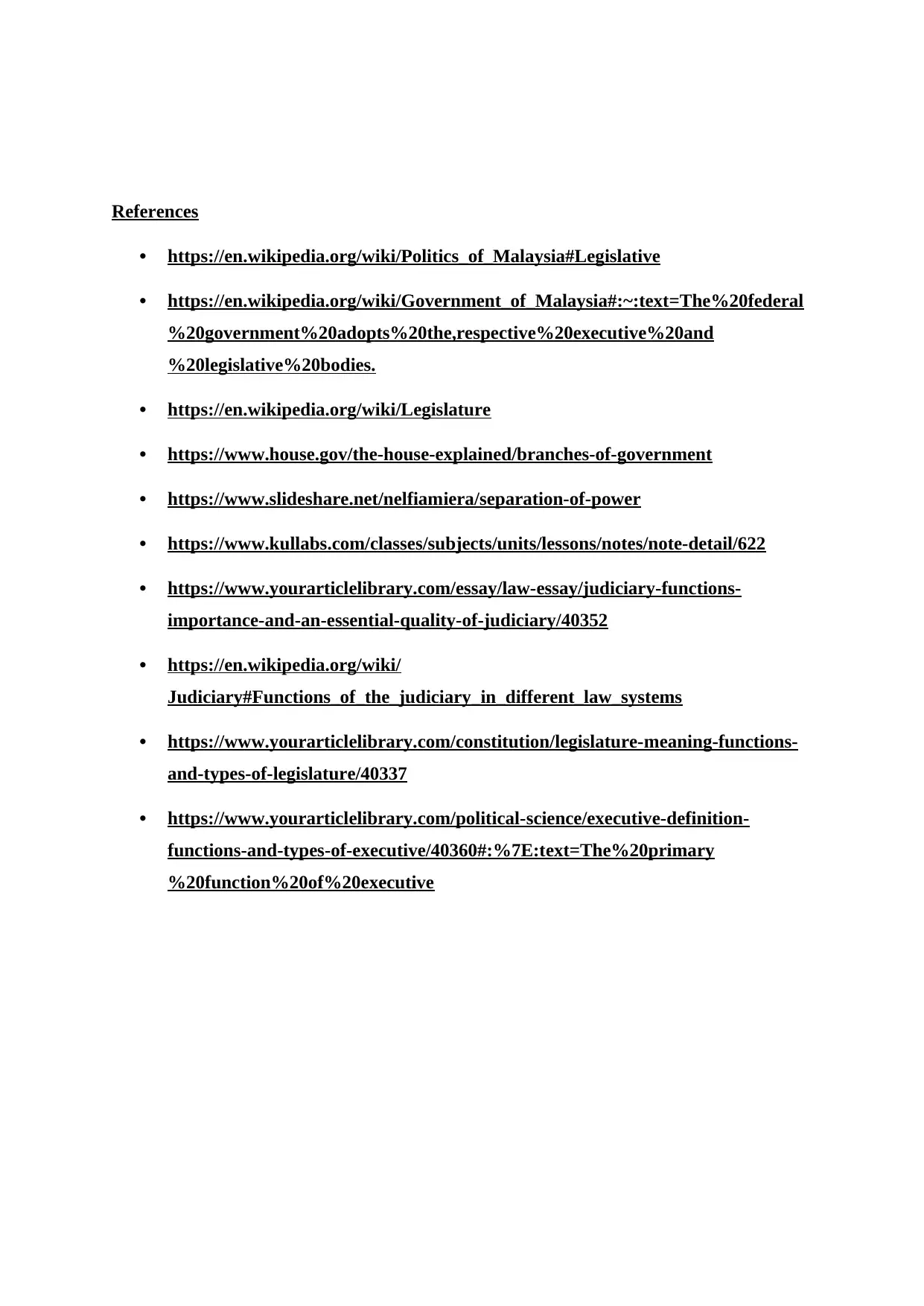
References
• https://en.wikipedia.org/wiki/Politics_of_Malaysia#Legislative
• https://en.wikipedia.org/wiki/Government_of_Malaysia#:~:text=The%20federal
%20government%20adopts%20the,respective%20executive%20and
%20legislative%20bodies.
• https://en.wikipedia.org/wiki/Legislature
• https://www.house.gov/the-house-explained/branches-of-government
• https://www.slideshare.net/nelfiamiera/separation-of-power
• https://www.kullabs.com/classes/subjects/units/lessons/notes/note-detail/622
• https://www.yourarticlelibrary.com/essay/law-essay/judiciary-functions-
importance-and-an-essential-quality-of-judiciary/40352
• https://en.wikipedia.org/wiki/
Judiciary#Functions_of_the_judiciary_in_different_law_systems
• https://www.yourarticlelibrary.com/constitution/legislature-meaning-functions-
and-types-of-legislature/40337
• https://www.yourarticlelibrary.com/political-science/executive-definition-
functions-and-types-of-executive/40360#:%7E:text=The%20primary
%20function%20of%20executive
• https://en.wikipedia.org/wiki/Politics_of_Malaysia#Legislative
• https://en.wikipedia.org/wiki/Government_of_Malaysia#:~:text=The%20federal
%20government%20adopts%20the,respective%20executive%20and
%20legislative%20bodies.
• https://en.wikipedia.org/wiki/Legislature
• https://www.house.gov/the-house-explained/branches-of-government
• https://www.slideshare.net/nelfiamiera/separation-of-power
• https://www.kullabs.com/classes/subjects/units/lessons/notes/note-detail/622
• https://www.yourarticlelibrary.com/essay/law-essay/judiciary-functions-
importance-and-an-essential-quality-of-judiciary/40352
• https://en.wikipedia.org/wiki/
Judiciary#Functions_of_the_judiciary_in_different_law_systems
• https://www.yourarticlelibrary.com/constitution/legislature-meaning-functions-
and-types-of-legislature/40337
• https://www.yourarticlelibrary.com/political-science/executive-definition-
functions-and-types-of-executive/40360#:%7E:text=The%20primary
%20function%20of%20executive
1 out of 10
Related Documents
Your All-in-One AI-Powered Toolkit for Academic Success.
+13062052269
info@desklib.com
Available 24*7 on WhatsApp / Email
![[object Object]](/_next/static/media/star-bottom.7253800d.svg)
Unlock your academic potential
Copyright © 2020–2026 A2Z Services. All Rights Reserved. Developed and managed by ZUCOL.




